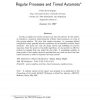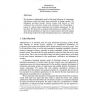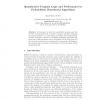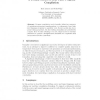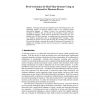148
click to vote
ARTS
1997
Springer
15 years 6 months ago
1997
Springer
We introduce PLC-Automata as a new class of automata which are tailored to deal with real-time properties of Programmable Logic Controllers (PLCs). These devices are often used in...
107
click to vote
ARTS
1997
Springer
15 years 6 months ago
1997
Springer
In 10 , an algebra for timed automata has been introduced. In this article, we introduce a syntactic characterisation of nite timed automata in terms of that process algebra. We s...
119
click to vote
ARTS
1997
Springer
15 years 6 months ago
1997
Springer
We introduce a mathematical model of the timed behaviour of components with streams as input and output using a hierarchy of timing concepts. We distinguish non-timed streams, dis...
117
click to vote
ARTS
1999
Springer
15 years 6 months ago
1999
Springer
In this paper we study the issue of progress for distributed timed systems modeled as the parallel composition of timed automata. We clarify the requirements of discrete progress (...
127
click to vote
ARTS
1999
Springer
15 years 6 months ago
1999
Springer
In this paper we show how quantitative program logic [14] provides a formal framework in which to promote standard techniques of program analysis to a context where probability and...
129
click to vote
ARTS
1999
Springer
15 years 6 months ago
1999
Springer
Program compilation can be formally defined as a sequence of equivalence-preserving transformations, or refinements, from highlevel language programs to assembler code. Recent mo...
118
click to vote
ARTS
1999
Springer
15 years 6 months ago
1999
Springer
This paper discusses the adaptation of the PVS theorem prover for performing analysis of real-time systems written in the ASTRAL formal specification language. A number of issues w...
194
click to vote
ARTS
1999
Springer
15 years 6 months ago
1999
Springer
Model checking can tell us whether a system is correct; probabilistic model checking can also tell us whether a system is timely and reliable. Moreover, probabilistic model checkin...

